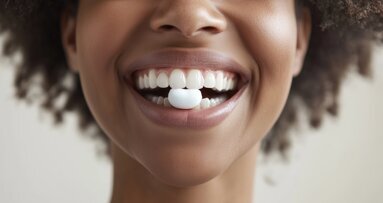SÃO PAULO, Brazil: Sugar substitutes have been promoted as a healthier alternative because of their low cariogenic potential and role in reducing caries risk. Research has also suggested that they have minimal effects on blood glucose levels, making them a common choice for individuals with diabetes. However, a recent study has found an association between the consumption of sugar substitutes and cognitive decline.1 This highlights the importance of considering both systemic and oral health effects when evaluating their overall benefits.
The findings stem from a longitudinal observational analysis using data on 12,772 civil servants aged 35 years and older from the Brazilian Longitudinal Study of Adult Health, which assessed participants at recruitment in 2008–10 and again in 2012–14 and 2017–19. Participants were divided into three groups according to their intake of low- and no-calorie sweeteners, which ranged from an average of 20 mg per day in the lowest group to 191 mg per day in the highest group. For comparison, these levels are well below the acceptable daily intake thresholds established by regulatory agencies, but they are within the range of what some individuals may consume through diet sodas, sugar-free gum or other products containing low- or no-calorie sweeteners.
All participants completed detailed dietary questionnaires at the beginning of the study. Cognitive assessments—including tests of verbal fluency, word recall, working memory and processing speed—were conducted at baseline and repeated at the midpoint and conclusion of the study.
After adjusting for age, sex, blood pressure and cardiovascular disease, the researchers found that individuals in the highest-intake group experienced cognitive decline at a rate 62% faster than those with minimal intake, a pace of decline comparable to that expected from approximately 1.6 years of normal ageing. This represents a modest but measurable difference in cognitive performance. Participants in the intermediate group declined 35% faster, equivalent to roughly 1.3 years of ageing. The association held for participants under 60 years of age. When stratified by diabetes status, higher intake was linked to faster decline in verbal fluency and global cognition among participants without diabetes and to faster decline in memory and global cognition among those with diabetes.
“Our findings suggest certain sweeteners may have negative effects on brain health over time.”—Dr Claudia Kimie Suemoto, University of São Paulo
Six of the seven sweeteners studied—aspartame, saccharin, acesulfame K, erythritol, xylitol and sorbitol—were associated with faster decline in memory and verbal fluency. Tagatose, however, showed no such association.
“Low- and no-calorie sweeteners are often seen as a healthy alternative to sugar; however, our findings suggest certain sweeteners may have negative effects on brain health over time,” senior author Dr Claudia Kimie Suemoto, associate professor of geriatrics at the University of São Paulo, said in a press release.
Since the study did not include all artificial sweeteners and diet data was self-reported by the participants, further research is needed to confirm the findings. Additionally, Dr Suemoto recommended that other refined sugar alternatives, such as apple sauce, honey, maple syrup or coconut sugar, should be investigated as healthier alternatives to sugar.
Link between sugar substitutes and oral health
While the study raises questions about systemic health impacts, oral health evidence continues to show benefits. A 2024 systematic review of 977 studies on sugar substitutes found that sugar alcohols—including xylitol, sorbitol, erythritol and maltitol—consistently reduced cariogenic bacteria in saliva and plaque.2 Additionally, a 2025 study reported that replacing sugar with aspartame may reduce caries incidence and decrease oral acid production and dental erosion.3 The authors of that study noted, however, that the caries reduction is more likely attributable to the avoidance of sugar consumption than to any direct biological effect of aspartame.
Some dental organisations have published statements and position papers that address sugar substitutes. For example, the American Dental Association states that sugar alcohols and other non-sugar sweeteners may help reduce caries by substitution of fermentable sugars, reduction of acid production, inhibition of the growth of Streptococcus mutans and increase of salivary flow. Furthermore, FDI World Dental Federation supports the view that replacing sugars with non-cariogenic substitutes in foods, drinks and chewing gum helps reduce the risk of caries.
Editorial note:
References:
- Gonçalves NG, Martinez-Steele E, Lotufo PA, Bensenor I, Goulart AC, Barreto SM, Giatti L, Perim de Faria C, Bisi Molina MC, Caramelli P, Marchioni DM, Suemoto CK. Association between consumption of low- and no-calorie artificial sweeteners and cognitive decline: an 8-year prospective study. Neurology. 2025 Oct 7;105(7):e214023. doi: 10.1212/WNL.0000000000214023.
- Liang NL, Luo BW, Sun IG, Chu CH, Duangthip D. Clinical effects of sugar substitutes on cariogenic bacteria: a systematic review and meta-analysis. Int Dent J. 2024 Oct;74(5):987–98. doi: 10.1016/j.identj.2024.02.008.
- Fleming SA, Fleming RA, Peregoy J. The non-cariogenic effects of aspartame: a systematic review and meta-analysis. J Dent. 2025 Jun;157:105715. doi: 10.1016/j.jdent.2025.105715.
Tags:



 Austria / Österreich
Austria / Österreich
 Bosnia and Herzegovina / Босна и Херцеговина
Bosnia and Herzegovina / Босна и Херцеговина
 Bulgaria / България
Bulgaria / България
 Croatia / Hrvatska
Croatia / Hrvatska
 Czech Republic & Slovakia / Česká republika & Slovensko
Czech Republic & Slovakia / Česká republika & Slovensko
 France / France
France / France
 Germany / Deutschland
Germany / Deutschland
 Greece / ΕΛΛΑΔΑ
Greece / ΕΛΛΑΔΑ
 Hungary / Hungary
Hungary / Hungary
 Italy / Italia
Italy / Italia
 Netherlands / Nederland
Netherlands / Nederland
 Nordic / Nordic
Nordic / Nordic
 Poland / Polska
Poland / Polska
 Portugal / Portugal
Portugal / Portugal
 Romania & Moldova / România & Moldova
Romania & Moldova / România & Moldova
 Slovenia / Slovenija
Slovenia / Slovenija
 Serbia & Montenegro / Србија и Црна Гора
Serbia & Montenegro / Србија и Црна Гора
 Spain / España
Spain / España
 Switzerland / Schweiz
Switzerland / Schweiz
 Turkey / Türkiye
Turkey / Türkiye
 UK & Ireland / UK & Ireland
UK & Ireland / UK & Ireland
 Brazil / Brasil
Brazil / Brasil
 Canada / Canada
Canada / Canada
 Latin America / Latinoamérica
Latin America / Latinoamérica
 USA / USA
USA / USA
 China / 中国
China / 中国
 India / भारत गणराज्य
India / भारत गणराज्य
 Pakistan / Pākistān
Pakistan / Pākistān
 Vietnam / Việt Nam
Vietnam / Việt Nam
 ASEAN / ASEAN
ASEAN / ASEAN
 Israel / מְדִינַת יִשְׂרָאֵל
Israel / מְדִינַת יִשְׂרָאֵל
 Algeria, Morocco & Tunisia / الجزائر والمغرب وتونس
Algeria, Morocco & Tunisia / الجزائر والمغرب وتونس
 Middle East / Middle East
Middle East / Middle East


































To post a reply please login or register